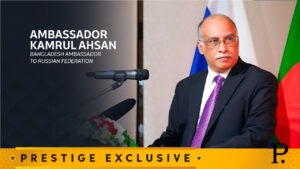Q. Share some insights into your early childhood and educational background?
I grew up in Chittagong, a city known for its rich cultural diversity. My upbringing in the Nandankanon neighborhood, nestled at the foothills of the imposing DC Hill, was marked by a harmonious blend of religious and cultural traditions. Here, Buddhist and Hindu temples coexisted alongside Christian Missionary School like the Saint Placid’s School. This multicultural tapestry greatly influenced my outlook on life.
My family, despite being Muslim, celebrated various religious festivals, including Buddha Purnima and Durga Puja. This celebration of diverse traditions fostered a sense of unity among us. The region’s natural beauty, with its lush hills and open spaces, encouraged outdoor activities like tree climbing, hiking, and exploring the wild, which ignited my enduring love for nature.
Chittagong itself was a unique place, characterized by its cosmopolitan nature. Our home, a testament to my grandfather’s business success, provided ample space for both play and learning. Despite our affluence, my father instilled in us a strong work ethic and the value of money. He supported our education but required us to manage our living expenses, including rent, transportation, and insurance.

I embarked on my educational journey, eventually leaving for the United States at the age of sixteen. My initial destination was Texas, where I encountered a culture vastly different from my own. Texans were warm and welcoming, yet the region felt isolated even within the diverse American landscape. People were curious about Bangladesh, often mistaking it for a part of Texas.
While pursuing computer science and engineering, I discovered my passion for programming and technology. My journey led me through Connecticut, where I briefly attended a community college, before returning to Texas. Upon graduating, I encountered the challenge of securing a job. I sent out countless CVs and faced numerous interviews, underscoring the importance of perseverance and meritocracy in my career.
After eventually landing a job in North Carolina, I worked on designing a just-in-time inventory system. Yet, I couldn’t escape the allure of Texas, which drew me back. There, I engaged in consulting work, tackling intriguing projects across the country.
Q. What sparked your interest in entering the business world, and how did you decide to explore various channels within the business sphere?
It was during this time that I met my wife, and we decided to get married in Chittagong. Following our marriage and the birth of our first child, I moved back to Bangladesh. Eager to make a mark in the emerging IT industry, I founded Base Limited, one of the first IT training centers in Bangladesh. We introduced international certified training programs from Oracle, Linux and Cisco for telecom companies, defense, and other corporations, bridging the IT skills gap in the country.
My journey in IT also led to the creation of innovative software, including one of the first Bangla learning programs. Inspired by my childhood experiences, I developed Pathshala, an interactive learning platform. Remarkably, my main developers were teenagers, a testament to the talent I discovered in Bangladesh.

While our software initially thrived, advancing technology eventually outpaced it, leading us to discontinue the project. Nonetheless, my enduring commitment to technology and education continues to shape my career and life
Q. Star Cineplex is known for revolutionizing the entertainment industry in Bangladesh. Could you tell us about the pivotal moments or strategies that transformed it into the country’s first multi-plex cinema?
My journey into the cinema industry was quite serendipitous. In the year 2000, while in an elevator at another office of the Bashundhara Group, I struck up a conversation with a high-ranking executive, possibly the Vice Chairman, who mentioned the idea of opening a shopping mall and possibly a cinema hall. I expressed my longing for the cinema experience I had enjoyed with my wife in the USA, and this conversation led to an unexpected opportunity.
However, I faced some skepticism from my conservative business family and others who believed that cinema was not a suitable venture for educated people. Despite this, I was determined to challenge these perceptions. I sought financing and encountered numerous rejections until Premier Bank’s Mr. Mazid believed in my vision and agreed to provide the necessary funding.
At that time, digital technology was not as advanced as it is today. During a visit to Delhi in 2000, I witnessed the first multiplex in India with five screens and saw people enjoying soft drinks and popcorn. The challenge was to secure quality content, as the market was lacking in this regard. I invested in state-of-the-art projection and dolby surround sound processing systems, as well as silver screens, and worked diligently to adapt to the emerging technology.
The quest for content took me to various places, including India and Hong Kong, where I approached major studios like Sony Pictures and Fox. Initially, many were skeptical due to the perceived lack of a market in Bangladesh, but Sony eventually trusted my commitment. “Spider-Man” became our first screening, and the success of “Gladiator” marked a turning point in building trust with the audience.
A pivotal moment came when a 95-year-old lady attended my theatre to watch “Joy-Jatra,” sharing that she hadn’t been to a cinema in 30 years. It was then that I realized the profound impact of our efforts. The focus on procuring content began to gain momentum, particularly for educated middle-class audiences seeking different and meaningful films.
The digital transformation, marked by the release of “Avatar 1,” prompted me to digitize all our cinemas with 3D technology, earning the trust of studios that we would not engage in piracy. Despite challenges with piracy and limited government support, advancements in internet speed ultimately led to a reduction in pirated CDs.

To enhance the cinema experience, I invested in better seating and introduced a VIP screen at Bashundhara. Today, all our projects feature high-quality digital projection, immersive sound system, and high gain screens. Although we believe we are on the right path, the cinema industry has faced setbacks, notably the COVID-19 pandemic.
I initiated the #SaveBDCinema campaign, and the government introduced a loan system to aid recovery. With the rise of streaming platforms like Netflix and OTT, quality content has become essential to entice audiences to leave their homes and endure traffic for a cinema experience. Cinema is not merely about watching movies; it’s about creating a unique and immersive environment free of any distraction.
Following the success of Bashundhara, I ventured to open another at Shimanto Square and set a lofty goal of establishing 100 screens. While we have achieved 20 screens, 15 more are in progress, with the aim of reaching 100 screens within three years. Recent movies like “Hawa” and “Poran” have shattered records, demonstrating the growing appetite for quality cinema. However, the market still lacks adequate quantity of good local content.
Q. As the owner of Sayeman Hotel in Cox’s Bazar, you’ve ventured into the hospitality sector. What motivated you to enter this industry, and what unique aspects do you bring to the table to enhance the guest experience?
My grandfather made significant contributions to Cox’s Bazar’s tourism industry. In 1964, he established the first private hotel in the area while developing the Chittagong-Cox’s Bazar road, initially paved with bricks. He also introduced the first bus service named Silver Arrow Transport, featuring around 36 Mercedes buses equipped with unique amenities, including attached toilets. The introduction of “hostess” on bus generated considerable excitement among the public in early 60s. Tragically, he passed away at the age of 62. Before his demise, he entrusted my father with the task of naming the hotel. My father suggested combining the first four letters of “Sayedur” and the last three letters of “Rahman,” resulting in the name “Sayeman.”
During the early 1970s, my father took over the management of the hotel. I became involved in overseeing its operations in 2000. By 2010, we realized that, as pioneers in Cox’s Bazar’s tourism and hotel industry, we were falling behind our competitors. My father, being a visionary, purchased a piece of land near the beach and envisioned a new project there. Collaborating with an architect, I designed the Sayeman Beach Resort to create a dramatic experience for our guests. Every aspect, from the swimming pool to the rooms, was meticulously designed to offer a memorable and theatrical atmosphere. We aimed to provide guests with an unforgettable experience from the moment they entered the hotel until they checked out.
Our next project presented a unique challenge. The legendary Hotel Sayeman built by my father in the 70s on original Sayeman property from 1964 with so much history and nostalgia, needed to be demolished due to its age and various issues. To attract visitors, I decided to adopt a neo-colonial design that evoked a nostalgic ambiance that brings back the past glory. The concept was to create a plaza-like environment where people could come together, make friends, and enjoy the courtyard and a vast swimming pool. We constructed a unique large floating pool, offering an engaging architectural experience.
The hotel also has a rich history, as it welcomed prominent figures, including Bangabandhu Sheikh Mujibur Rahman in 1969. During this visit, my father’s engineering expertise came to the forefront when he showcased a special candle that could withstand rain and other elements. Impressed by this innovation, Bangabandhu invited my father to join his endeavors. During the 1970s and 80s, Sayeman has hosted various distinguished guests, including past head of state Ziaur Rahman, Hussain Muhammad Ershad, and our Honorable Prime Minister, along with their families. Sunil Datta, too, has graced us with his presence, making our establishment a historical landmark. I aspire to transform it into a heritage site, preserving its rich history and contributing to the region’s cultural legacy.
Q. Could you share your thoughts on the current state of the entertainment sector in Bangladesh and why you believe it’s essential to drive change? What opportunities and challenges do you see in reshaping this sector?
I firmly believe in cooperation rather than competition. I’m open to assisting others entering the industry, as we need collective success. Collaboration and support are crucial for the growth of the Bangladeshi cinema industry.
In my quest to find solutions through cinema, I have tackled essential issues such as women’s empowerment and the serious problem of drug addiction. My films aim to deliver impactful messages based on real events, shedding light on prevalent issues like sexual harassment and mental abuse. My dedication to creating meaningful cinema continues as I work to address critical societal challenges.
Q. You are known for promoting sports in Bangladesh. Can you elaborate on the significance of sports and healthy living in today’s society, and how do you engage with these activities to foster positive change?
I ensure that all my sporting activities are carbon-neutral such as stand-up paddle boarding, kayaking, trail-running and mountain biking. One initiative I have undertaken is plogging, a combination of jogging and picking up litter, which is embraced by every member of our No-Dorai surfing club in Cox’s Bazar. Furthermore, we provide essential support to around 26 beach children, offering them two meals a day, surfing lessons and basic life skills training, including English and Math lessons.
Q. Lastly, what is your vision for the future, both personally and professionally? Are there any new projects or initiatives you are excited about and wish to bring to fruition in the coming years?
Our upcoming project involves launching a pool-villa resort in Inani, aimed at offering enhanced privacy and a superior guest experience. Additionally, my family is a sponsor shareholder of another property called The Peninsula Chittagong which was founded by us but now is a Public Limited Company. Our new expansion, The Peninsula Airport Garden, a 200 room five star property by the junction of Karnaphuli River and the Bay of Bengal is scheduled to open its doors in March 2024, marking a significant milestone in Chittagong’s hospitality industry.

In terms of my other endeavors, I am committed to continuing my father’s legacy of environmental stewardship. My father was deeply concerned about the environmental challenges we face, particularly the destruction of crop lands that could lead to a food crisis. He set an inspiring example by establishing the first eco-friendly brick factory. Our commitment to sustainability extends to all our properties, including our homes and hotels, where we use eco-friendly materials, solar energy, sewage treatment plant and rain water harvesting to minimize any adverse impact on the environment.
Embracing this eco-conscious ethos has become a personal motto for me, and I go to great lengths to reduce my own carbon footprint. I prioritize walking whenever possible to minimize my impact on the environment. Additionally, I engage in extensive tree plantation efforts and have personally planted 100,000 trees in previously barren areas. Witnessing the inspiration these actions have sparked in others is truly rewarding. I take every opportunity in my speeches to raise awareness about environmental concerns and the changing world, emphasizing the need for collective action.
Recognizing the urgency of the climate crisis, I have shortened my international journeys unless they are absolutely essential. I am determined to inspire people to take responsibility for their surroundings. While it can be challenging to change ingrained habits, such as littering on beaches, I firmly believe that we can make a difference. Even in the face of disappointing situations like the garbage problem on Saint Martin Island, where companies like Coca-Cola are making efforts, I remain committed to doing everything in my power to address such issues.
I believe in empowering the youth to harness technology for positive change. While today’s youth are deeply connected to technology, I encourage them to channel their enthusiasm towards entrepreneurship and innovation. Rather than being passive observers or critics, they can proactively address issues such as rising chili prices by planting chili trees at home or combatting heat by planting trees. Let’s remember that technology should serve us, not the other way around, and let’s take charge of our future by embracing positive actions for change.






